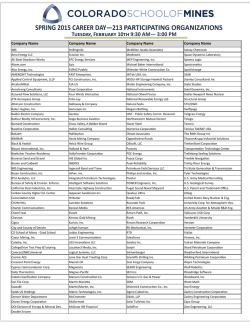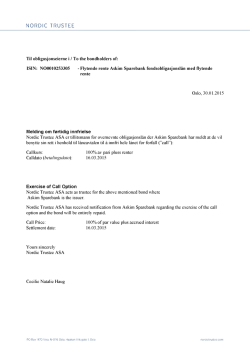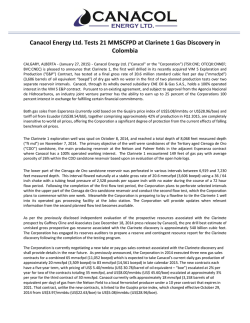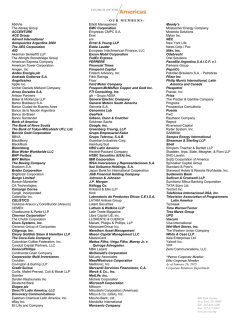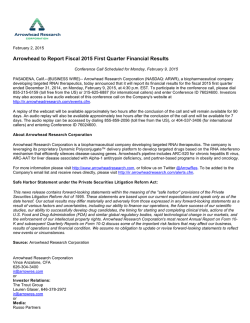
AMENDED AND RESTATED BY-LAWS OF WNET ARTICLE I NO
AMENDED AND RESTATED BY-LAWS OF WNET ARTICLE I NO MEMBERS In accordance with the provisions of Section 601(a) of the Not-for-Profit Corporation Law of the State of New York (the “NPCL”), WNET (the “Corporation”) has no members. ARTICLE II PURPOSES SECTION 1. Purposes. The Corporation is organized for exclusively educational purposes under Section 501(c)(3) of the Internal Revenue Code of 1986, as amended (the “Code”). The Corporation is chartered (the “Charter”) by the Regents of the University of the State of New York (the “Regents”). The purposes for which the Corporation is formed are: (a) to foster the ideals of excellence, engagement, and education in all manner and media throughout the local communities served by the Corporation and beyond; (b) to acquire, construct and operate noncommercial educational radio and television stations, to obtain and hold appropriate authorizations and licenses for the operation of said stations from State or Federal authorities, and to participate in state, regional, and national educational networks; (c) to acquire, build, and operate other media platforms, including, but not limited to, various forms of new and traditional media; (d) to create, acquire, and preserve content in all manner and media that inspires, celebrates imagination, facilitates informed discussion, supports the healthy development and education of children, explores history, science, humanities, and culture and arts, including but not limited to educational, entertaining and cultural programs, films, and recordings; (e) to distribute the Corporation’s content in all manner and media worldwide, whether on the Corporation’s media platforms or through sale or license to any other persons, corporations, or organizations, whether commercial or noncommercial; and (f) to aid, assist, and work in conjunction with corporations, educational institutions, organizations, agencies, foundations, and individuals interested or engaged in any of the fields or purposes of the Corporation, and generally to encourage and foster educational and cultural television, broadcasting, and media. WNET 85996 v1 2 In furtherance of these purposes, the Corporation will: (a) promote and support educational television, broadcasting and electronic media; (b) operate public broadcasting stations and electronic media platforms, including operation of WNET (TV), and WLIW(TV) with regard for the promotion of educational television in, and service to, the greater metropolitan New York City area, including New Jersey, Connecticut and Long Island; (c) solicit, collect, accept, receive, hold, invest, reinvest, and administer gifts, legacies, bequests, devises, funds, benefits of trusts and profits of any sort or nature, without limitation as to amount or value, and use, apply, employ, expend, disburse, or donate the income or principal thereof, and generally devote the same to any of the purposes of the Corporation; and (d) do any and all lawful acts and things which may be necessary, useful, suitable, desirable or proper for the furtherance or accomplishment of any or all of the foregoing purposes. ARTICLE III LIMITATIONS SECTION 1. Limitations. (a) The Corporation will be a nonstock corporation organized and operated exclusively for educational purposes, and no part of its net earnings will inure to the benefit of any individual, and no trustee (each a “Trustee” and together, the “Trustees”), officer (each an “Officer” and together, the “Officers”), or employee of the Corporation will receive or be entitled to receive any pecuniary profit from the operations thereof, except reasonable compensation for services. (b) The Corporation will not carry on any activities not permitted to be carried on (a) by a corporation exempt from Federal income tax under Code Section 501(c)(3) or (b) by a corporation, contributions to which are deductible under Code Section 170(c)(2). (c) No substantial part of the activities of the Corporation will be devoted to carrying on propaganda, or otherwise attempting to influence legislation (except to the extent authorized by Code Section 501(h) during any fiscal year or years in which the Corporation has chosen to utilize the benefits authorized by the statutory provision), and the Corporation will not participate in or intervene (including the publishing or distribution of statements) in any political campaign on behalf of or in opposition to any candidate for public office. (d) Upon dissolution of the Corporation, the Board of Trustees (the “Board”) will dispose of the remaining assets of the Corporation, after paying or making provision for the payment of all the liabilities of the Corporation, exclusively for one or more exempt purposes, within the meaning of Code Section 501(c)(3), or will distribute the same to the Federal government, or to a state or local government, for a public purpose. Any assets not so disposed WNET 85996 v1 3 of will be disposed of pursuant to the procedures outlined in Article 10 of the NPCL, exclusively for such purposes or to such organization or organizations, organized and operated exclusively for such purposes, as the Attorney General or justice of the Supreme Court may determine. ARTICLE IV TRUSTEES SECTION 1. Powers and Duties. The activities and affairs of the Corporation will be managed by the Board. Subject to Section 236 of the Education Law of the State of New York (the “Education Law”), the Board will manage the business, property, provide for the operation of television stations and/or radio stations, make all decisions of policy, employ and appoint all necessary executives, agents and representatives to carry out the purposes of this Corporation, and will do all other things in the management of the business, property and affairs of the Corporation necessary to carry out its purposes. SECTION 2. Number. The number of Trustees that will constitute the Board will be fixed by a majority of the Trustees then in office; provided, however, that the number of Trustees will not be decreased by the Board to a number less than the number of Trustees then in office. The Board will consist of not less than five (5) nor more than fifty-five (55) persons, at least one of whom must be a resident of the state of New York; for the purposes of Section 702 of the NPCL, the “entire board” shall consist of the number of Trustees within such range that were elected as of the most recently held election of Trustees. SECTION 3. Election, Term of Office, and Classification. Trustees, except as provided in Section 6 of this Article IV, will be elected by the Board at the annual meeting of the Board, as set forth in Section 7 of this Article IV (the “Annual Meeting of the Board”). The term of office of each Trustee will be three (3) years, expiring at the Annual Meeting of the Board in the year in which such Trustee will have served his or her three (3) year term, or, if later, until his or her successor has been elected and qualified or, if earlier, until such Trustee’s death, resignation or removal. Trustees will stand for election after each three-year term and may serve up to four (4) consecutive terms; provided, however, that any Trustee then serving as chairman of the Board (the “Chairman”) or vice chairman of the Board (each a “ViceChairman” and together, the “Vice-Chairmen”) will be exempt from term limits while serving in such positions. In order that a rotating system of election may prevail, the Board will be classified into three (3) approximately equal classes of Trustees (each a “Class” and together, the “Classes”), each labeled “Class of ____” by the year that such Class was elected. The term of each Class will be staggered such that only one Class is subject to reelection in any given year. SECTION 4. Removal or Suspension. A majority of the entire Board may remove or suspend from office any Trustee on examination and due proof of the truth of a written complaint by any Trustee of misconduct, incapacity or neglect of duty; provided, however, that at least one week’s previous notice of the proposed action will have been given to the accused Trustee and to each of the other Trustees. The Regents, after a hearing before the Regents or a committee thereof, may remove any Trustee for misconduct, incapacity, neglect of duty or where it appears to the satisfaction of the Regents that the Corporation has failed or WNET 85996 v1 4 refuses to carry into effect its educational purposes. At least ten (10) days notice of the time and place of such hearing will be given to the Trustees. SECTION 5. Resignation, Actual and Deemed. Any Trustee may resign at any time, orally or in writing, by notifying the President or the Secretary. Any such resignation will take effect at the time therein specified, and, unless otherwise specified, the acceptance of such resignation will not be necessary to make it effective. If any Trustee fails to attend three (3) consecutive meetings of the Board without excuse accepted as satisfactory by the Board, the Board is authorized to deem such Trustee to have resigned and to fill the vacancy as provided in Section 6 of this Article IV. SECTION 6. Vacancies and Increase. Newly created trusteeships resulting from an increase in the total number of Trustees, and vacancies among such Trustees for any reason, may be filled by vote of a majority of the Trustees then in office, regardless of their number, at any meeting of the Board; provided, however, that the Board will confirm any Trustee so elected at the Annual Meeting of the Board. Any Trustee elected to fill a vacancy whose initial term is less than three years will be permitted to serve four (4) additional terms after serving his or her initial partial term. Any vacancy in the office of Trustees continuing for more than one (1) year, or any vacancy reducing the number of Trustees in office to less than two-thirds of the full number designated pursuant to Section 2 of this Article IV, may be filled by the Regents. If the Regents, as provided in Section 4 of this Article IV, should remove any Trustee from office, the Regents may fill the vacancy so created by appointing a successor to the Trustee so removed. SECTION 7. Annual Meeting. The Annual Meeting of the Board will be held in New York State in May of each year, or at such other time and place as may be determined by the Board or the President and designated in the notice of the meeting. At each Annual Meeting of the Board or adjournment thereof, the Board will be entitled to elect Trustees and may transact such other business as may properly come before the meeting. The first meeting of the newly-elected Board, if held immediately after election of such Board and if a quorum be present, will be deemed to be a continuation of the Annual Meeting of the Board. SECTION 8. Regular Meetings. The Board will hold regular meetings at such time and place and at such intervals as the Board will fix from time to time. SECTION 9. Special Meetings. The Chairman, the President or the Secretary may call, and by written request signed by three Trustees, must call, special meetings of the Board. SECTION 10. Place of Meetings. Any and all meetings of the Board will be held at the office of the Corporation or at such other place, within or without the State of New York, as may be designated in the notice or waiver of notice of such meeting. SECTION 11. Notice of Meetings. Notice of the time and place of every meeting of the Board will be mailed not less than five (5) nor more than fifteen (15) days before such meeting, to the usual address of every Trustee. Alternatively, notice may be given by telephone or sent by facsimile transmission, courier service, electronic mail or hand delivery WNET 85996 v1 5 not less than five (5) nor more than fifteen (15) days before such meeting. Any business may be transacted by the Board at a meeting at which every member of the Board is present, though held without notice. SECTION 12. Waiver of Notice. Notwithstanding the provisions of Section 11 of this Article IV, notice of a meeting of the Board need not be given to a Trustee who submits a signed waiver of notice whether before or after the meeting, or who attends the meeting without protesting, prior thereto or at its commencement, the lack of notice to him or her. Such waiver of notice may be written or electronic. If written, the waiver must be executed by the Trustee signing such waiver or causing his or her signature to be affixed to such waiver by any reasonable means including but not limited to facsimile signature. If electronic, the transmission of the consent must be sent by electronic mail and set forth, or be submitted with, information from which it can reasonably be determined that the transmission was authorized by the Trustee. SECTION 13. Quorum. Except as otherwise provided by law, by the Charter or these by-laws (the “By-Laws”), if the number of Trustees designated pursuant to Section 2 of this Article IV is more than fifteen (15), then the presence in person of at least five (5) Trustees plus one additional Trustee for every ten (10) Trustees (or fraction thereof) in excess of fifteen will be necessary and sufficient to constitute a quorum. If the number of Trustees designated pursuant to Section 2 of this Article IV is fifteen (15) or less, the presence in person of one-third of such number of Trustees will be necessary and sufficient to constitute a quorum. In the absence of a quorum, a smaller number may adjourn any meeting to a later date. If notice is given by telephone, facsimile transmission, electronic mail, or hand delivery, at least one (1) day’s notice of such adjourned date must be given to each Trustee who is not present at such meeting. If by mail or courier service, at least two (2) days notice must be given to each Trustee who is not present at such meeting. For the avoidance of doubt, the following chart sets forth the number of Trustees that are required for a quorum: Total Number of Trustees 13-15 16-25 26-35 36-45 46-55 Number of Trustees Required for a Quorum 5 6 7 8 9 SECTION 14. Action by Majority Vote. (a) Except as otherwise expressly required by law, the Regents, the Charter or these By-Laws, the vote of a majority of the Trustees present at a meeting at which a quorum is present will be an act of the Board. (b) Any action may be taken by the Trustees without a meeting if all Trustees entitled to vote with respect to the subject matter thereof consent to the adoption of a resolution authorizing the action. Such consent may be written or electronic. If written, the consent must WNET 85996 v1 6 be executed by the Trustee by signing such consent or causing his or her signature to be affixed to such consent by any reasonable means, including, but not limited to, facsimile signature. If electronic, the transmission of the consent must be sent by electronic mail and set forth, or be submitted with, information from which it can reasonably be determined that the transmission was authorized by the Trustee. The resolution and the written consents thereto by the Trustees shall be filed with the minutes of the proceedings of the Board. SECTION 15. Compensation. The Trustees will serve without salary or other remuneration for their service as Trustees. Trustees may be reimbursed for expenses actually and reasonably incurred by them in connection with attendance at meetings and with the performance of other authorized duties in connection with the business and affairs of the Corporation, provided that such expenses have been approved by the Corporation’s treasurer (the “Treasurer”), or by the Board. No employee of the Corporation, should he or she be a Trustee, will be present at or otherwise participate in any Board or committee deliberation or vote on a question relating to his or her own salary or emoluments; however, the Board or authorized committee may request that such person present information as background or answer questions at a Board or committee meeting prior to the commencement of deliberations or voting with respect to his or her compensation SECTION 16. Remote Participation. Trustees may participate in any meeting of the Board, or any meeting of a committee established pursuant to Article V (each, a “Committee”), by means of a conference telephone or similar communications equipment or by electronic video screen communication. Participation by such means shall constitute presence in person at a meeting as long as all persons participating in the meeting can hear each other at the same time and each Trustee can participate in all matters before the Board, including, without limitation, the ability to propose, object to, and vote upon a specific action to be taken by the Board or Committee. SECTION 17. Life Trustee. The nominating committee of the Corporation (the “Nominating Committee”) may recommend to the Chairman, for designation as a Life Trustee, a retiring Trustee who has demonstrated outstanding service, ability, and commitment to the Corporation and/or its affiliated entities. Appointment to the title of Life Trustee will be subject to the following considerations: 1) service on the Board or one of its affiliated entities for at least seven years; 2) attendance at a high percentage of Board meetings; 3) active participation on at least one working Committee annually; 4) generous financial support within the Trustee’s means; and 5) unusual contributions of a non-financial nature which might outweigh other considerations. Life Trustees may not vote at Board or Committee meetings nor will their presence or absence affect the determination of a quorum, except where the Board has passed a resolution electing a Life Trustee to serve as a voting member of the Board (a “Voting Life Trustee”). A Voting Life Trustee may also serve as a voting member of any Committee. Life Trustees will be entitled to expense reimbursement in accordance with Section 15 of this Article IV. Life Trustees will be otherwise entitled to the same privileges afforded to Trustees. Any Life Trustee may be removed with or without cause by resolution passed by the Board at any meeting of the Board. After serving as a Life Trustee for one (1) year, the Nominating Committee may nominate a Life Trustee as a candidate for election to the Board, and upon reelection to the Board, the individual will be a Trustee and not a Life Trustee, with full rights and privileges afforded to Trustees under these By-Laws and prescribed by law. WNET 85996 v1 7 SECTION 18. Officers Emeriti. The Nominating Committee may recommend to the Chairman, for designation as an Officer Emeritus, a retiring Chairman or Vice-Chairman who has demonstrated outstanding service, ability, and commitment to the Corporation and/or its affiliated entities. Officers Emeriti may not vote at Board or Committee meetings nor will their presence or absence affect the determination of a quorum. Officers Emeriti will be entitled to expense reimbursement in accordance with Section 15 of this Article IV. Officers Emeriti will be otherwise entitled to the same privileges afforded to Trustees. Any Officer Emeriti may be removed with or without cause by resolution passed by the Board at any meeting of the Board. After serving as an Officer Emeritus for one (1) year, the Nominating Committee may nominate an Officer Emeritus as a candidate for election to the Board, and upon re-election to the Board, the individual will be a Trustee and not an Officer Emeritus, with full rights and privileges afforded to Trustees under these By-Laws and prescribed by law. SECTION 19. Disclosure of Conflicts of Interest. Trustees, Voting Life Trustees, if any, and Officers must sign and submit an annual conflicts of interest disclosure statement and any prospective Trustee must submit such statement prior to his or her election to the Board. In addition, each Trustee, Voting Life Trustee, and Officer must report promptly to the Corporation any potential conflict of interest as and when it arises. SECTION 20. Loans to Directors and Officers. Subject to the exceptions outlined in Section 716 of the NPCL and Section 216-a of the Education Law, no loans will be made by the Corporation to any Trustee or Officer, or to any other entity in which one or more Trustee or Officer is a director or officer or holds a substantial financial interest. ARTICLE V COMMITTEES SECTION 1. Executive Committee. (a) Selection, Removal and Vacancies. The Board will establish an executive committee (the “Executive Committee”). All members of the Executive Committee must be Trustees or Voting Life Trustees, and the Executive Committee will consist of not less than five (5) members. Members of the Executive Committee will consist of the Chairman and ViceChairman or Vice-Chairmen of the Board, plus the chair of each other Committee, provided that each such chair is a Trustee, and any other Trustees elected by a majority of the entire Board at any meeting of the Board, and will serve until the next Annual Meeting of the Board and until such member’s successor is duly elected and qualified, or until such member’s earlier death, resignation or removal. The Chairman of the Board will serve as the chair of the Executive Committee. Any member of the Executive Committee may be removed with or without cause by the Board. (b) Operations. Except as otherwise provided herein and subject to limitations prescribed by law, the Executive Committee may transact, in intervals between meetings of the Board, any business of the Corporation. Such authority may include authorizing the seal of the Corporation to be affixed to any paper which may require it. The Executive Committee will not have and may not exercise the power to grant degrees (if such power has been conferred on the WNET 85996 v1 8 Board), the power to elect members of the Executive Committee, the power to fill vacancies in the Board or in the Executive Committee, or the power to remove Trustees or Officers. SECTION 2. Additional Committees of the Board. The Board may from time to time authorize the creation of additional committees of the Board (each a “Committee of the Board” and together with the Executive Committee, the “Committees of the Board”), including, but not limited to: the Audit Committee; the Finance Committee; the Investment Committee; the Nominating Committee; and the Personnel and Diversity Committee. All members of each Committee of the Board must be Trustees or Voting Life Trustees, and each Committee of the Board will have at least three (3) members. Subject to the limitations prescribed by law, each Committee of the Board will be delegated the authority to act as the full Board when exercising the powers and authority granted to a Committee of the Board by the Board and as set forth in each Committee of the Board’s charter. The members of each Committee of the Board will be elected by a majority of the entire Board at any meeting of the Board, and will serve until the next Annual Meeting of the Board and until such member’s successor is duly elected and qualified, or until such member’s earlier death, resignation or removal. Any member of a Standing Committee may be removed, with or without cause, by the Board. The Board will elect the chair of each Committee of the Board. SECTION 3. Committees of the Corporation. The Board may from time to time authorize the creation of committees of the Corporation (each a “Committee of the Corporation” and together, the “Committees of the Corporation”), including, but not limited to: the Education Committee; the Development Committee; the Interactive and Technology Committee; the Program Committee; and the WLIW Committee. Each Committee of the Corporation will have the power to recommend action to the Board as set forth in their individual charters, but will not have the power to take any corporate action. Members of Committees of the Corporation need not be Trustees. The members of each Committee of the Corporation will be elected by the Board at any meeting of the Board, and will serve until the next Annual Meeting of the Board and until such member’s successor is duly elected and qualified, or until such member’s earlier death, resignation or removal. Any member may be removed, with or without cause, by the Board. The Board will elect the chair of each Committee of the Corporation. SECTION 4. Special Committees. The Board may from time to time authorize the creation of special committees (each a “Special Committee” and together, the “Special Committees”), and may determine the names of such Special Committees, the term of existence of each Special Committee, and, to the extent permitted by law and by these By-Laws, may delegate specific powers and duties of the Board to such Special Committees. Special Committees will only have those powers specifically delegated to each by the Board and are intended to be committees with limited existence. There is no minimum required number of members for each Special Committee, but all members of each Special Committee must be Trustees or Voting Life Trustees. The Chairman may appoint the members of such Special Committees or may authorize the President and/or any other Officer or Officers to select the members of any such Special Committee. The Chairman will appoint a chair of each Special Committee who will serve until the Special Committee has fulfilled its purpose. WNET 85996 v1 9 SECTION 5. Operation of Committees. Fifty percent (50%) of the membership of a Committee will constitute a quorum for the transaction of business, and any action taken by a majority of the members of a Committee present at a meeting, at which a quorum is present, will constitute the act of such Committee. Any vacancy on a Committee will be filled by the Board in the same manner that members of such Committee are generally elected. Sections 5, 15, and 16 of Article IV, relating to the operation of the Board, are also applicable to all Committees. Each Committee will, for so long as it exists, meet as least once annually, or more frequently as circumstances dictate, and keep a record of its actions. Subject to the limitations contained in these By-Laws, each Committee may make rules of the calling, holding and conducting of its meetings and the keeping of the records thereof; provided that reasonable notice of all meetings of each Committee will be given to its members thereof unless such notice is waived in the manner prescribed by Section 12 of Article IV. ARTICLE VI OFFICERS OF THE CORPORATION SECTION 1. Officers/Election. The Officers will include a Chairman of the Board, a Vice-Chairman or Vice-Chairmen of the Board, a President, such number of VicePresidents as may from time to time be determined by the Board, a Secretary, a Treasurer, and such Assistant Secretaries and Assistant Treasurers as the Board, in its discretion, may from time to time designate. Officers other than the Chairman and Vice-Chairman or Vice-Chairmen of the Board need not be Trustees. Officers will be elected by the Board at the Annual Meeting of the Board. The Board may elect such other additional Officers, with such duties and authority, as it sees fit. Any two of the foregoing Offices, except those of Chairman and President, President and Vice-President, or President and Secretary, may be held by the same person. SECTION 2. Term. The term of office of each Officer (including any Officer who may occupy an additional office created by the Board), other than the Chairman and any Vice-Chairmen, will be one (1) year and until his or her successor is elected and qualifies. As set forth in Section 6 and Section 7 of this Article VI, the term of office of the Chairman and any Vice-Chairmen will be two (2) years and until his or her successor is elected and qualified. SECTION 3. Removal. Any Officer may be removed either with or without cause by resolution passed by the Board at any meeting of the Board. SECTION 4. Resignations. Any Officer may resign at any time by notifying the Board, the President, or the Secretary orally or in writing. Such resignation will take effect at the time therein specified and, unless otherwise specified, the acceptance of such resignation will not be necessary to make it effective. SECTION 5. Vacancies. A vacancy in any office may be filled for the unexpired portion of the term by the Board at any meeting of the Board. SECTION 6. Chairman. The Board will elect a Chairman from among its membership for a term of two (2) years and until the election and qualification of his or her successor. No employee of the Corporation shall serve as Chairman. Meetings of the Trustees will be presided over by the Chairman or in his or her absence by a Vice-Chairman or in the WNET 85996 v1 10 absence of the Vice-Chairman by the President, or if all are absent, by a Trustee to be chosen at the meeting. SECTION 7. Vice-Chairman. The Board will elect a Vice-Chairman or Vice-Chairmen from among its membership for a term of two (2) years and until the election and qualification of his or her successor. No employee of the Corporation shall serve as ViceChairman. SECTION 8. The President. The President will be the chief executive officer of the Corporation, subject, however, to the control of the Board. In general, he or she will perform all the duties incident to the office of the chief executive officer of a corporation and such other duties as are provided for in these By-Laws and as from time to time may be assigned to him or her by the Board. SECTION 9. The Vice-Presidents. At the request of the President, the Board or the Executive Committee, the Vice-Presidents designated by the Board will perform all the duties of the President and in so acting will have all the powers of and be subject to all the restrictions upon the President. Any Vice-President will perform such other duties as may from time to time be assigned to him or her by the Board or by the President. SECTION 10. The Treasurer. The Treasurer will: (i) collect and keep an account of all moneys received and expended for the use of the Corporation; (ii) deposit sums received by the Corporation in the name of the Corporation in such depositories as will be approved by the Board; (iii) make reports of the finances of the Corporation (including the annual report on the Corporation’s restricted assets required by Section 513(b) of the NPCL) at each Annual Meeting of the Board and when called upon by the President; and (iv) perform such other duties as will be directed by the Board or by the President. The funds, books and vouchers in the hands of the Treasurer (the “Financial Records”) will at all times be subject to the inspection, supervision and control of the Board and the President and, at the expiration of his or her term of office, the Treasurer will turn over to his or her successor in office the Financial Records, moneys and other properties in his or her possession. SECTION 11. The Secretary. The Secretary will: (i) act as Secretary of all meetings of the Board and keep the minutes thereof in the proper book or books to be provided for that purpose; (ii) see that all notices required to be given by the Corporation are duly given and served; (iii) have charge of the books, records and papers of the Corporation other than the Financial Records; (iv) see that the reports, statements and other documents required by law, other than the Financial Records, are properly kept and filed; and (v) in general, perform all the duties incident to the office of secretary of a corporation and such other duties as may from time to time be assigned to him or her by the Board or by the President. SECTION 12. Assistant Secretaries and Assistant Treasurers. Assistant Secretaries and Assistant Treasurers will perform such duties as will be assigned to them by the Secretary or by the Treasurer, respectively, or by the President or by the Board. SECTION 13. Compensation. Salaries or other compensation of the Officers and employees of the Corporation may be fixed from time to time by the Board or a WNET 85996 v1 11 Committee. No more than two salaried employees of the Corporation may be members of the Board, and neither of them will be prevented from receiving his or her salary by reason of fact that he or she is also a Trustee of the Corporation; provided, however, that neither of such salaried employees, who will be serving as a member of the Board, will be present at or otherwise participate in any Board or Committee deliberation or have a vote in any question relating to his or her own salary or other emoluments, however, the Board or authorized committee may request that a person present information as background or answer questions at a Board or Committee meeting prior to the commencement of deliberations or voting with respect to his or her compensation Officers may be reimbursed for expenses actually and reasonably incurred by them in connection with the performance of authorized duties in connection with the business and affairs of the Corporation; provided that such expenses will have been approved by the President, or the Treasurer, or by their designees, or by the Board; and provided, further, that no Officer may approve his or her own expenses. ARTICLE VII INDEMNIFICATION SECTION 1. Indemnification. To the fullest extent permitted by law: (a) The Corporation will indemnify any person (and that person’s heirs, executors, guardians, administrators, assigns and any other legal representative of that person) who was or is a party or is threatened to be made a party to or is involved in (including as a witness) any threatened, pending, or completed action, suit, proceeding or inquiry (including, but not limited to, actions brought in the right of the Corporation), whether civil, criminal, administrative, or investigative, and whether formal or informal, including appeals, by reason of the fact that the person is or was a Trustee or Officer, or, while a Trustee or Officer is or was serving at the request of the Corporation as a director, officer, partner, trustee, employee, or agent of another corporation, partnership, joint venture, trust, or other enterprise, for and against all expenses (including attorneys’ fees), judgments, fines and amounts paid in settlement actually and reasonably incurred by that person or that person’s heirs, executors, guardians, administrators, assigns or legal representatives in connection with that action, suit, proceeding or inquiry, including appeals. Notwithstanding the foregoing, the Corporation will indemnify any person seeking indemnification in connection with an action, suit, proceeding or inquiry (or part thereof) initiated by that person only if that action, suit, proceeding or inquiry (or part thereof) was authorized by the Board or the Corporation is ordered to indemnify that person by a court of law. (b) No indemnification will be made to or on behalf of a Trustee or Officer if a judgment or other final adjudication adverse to the Trustee or Officer establishes that his or her acts were committed in bad faith or were the result of active or deliberate dishonesty and were material to the cause of action so adjudicated, or that he or she personally gained in fact a financial profit or other advantage to which he or she was not legally entitled. (c) Any indemnification made pursuant to this Article will be authorized according to the procedures set forth in Article 7of the NPCL. WNET 85996 v1 12 (d) The Corporation will pay expenses as incurred by any person described in subsection (a) of this Section 1 in connection with any action, suit, proceeding or inquiry described in subsection (a) of this Section 1; provided, that, if these expenses are to be paid in advance of the final disposition (including appeals) of an action, suit, proceeding or inquiry, then the payment of expenses will be made only upon delivery to the Corporation of an undertaking, by or on behalf of the person, to repay any amounts so advanced to the extent that it is ultimately determined that the person is not entitled to be indemnified under this Article VII or otherwise for such amounts. (e) The Corporation may purchase and maintain insurance on behalf of any person described in subsection (a) of this Section 1 against any liability asserted against that person, whether or not the Corporation would have the power to indemnify the person against that liability under the provisions of this Article VII or otherwise. (f) The provisions of this Article VII will be applicable to all actions, suits, proceedings or inquiries made or commenced after the adoption of this Article VII, whether arising from acts or omissions occurring before or after its adoption. The provisions of this Article VII will be deemed to be a contract between the Corporation and each Trustee or Officer who serves in such capacity at any time while this Article VII and the relevant provisions of the laws of the State of New York and other applicable law, if any, are in effect, and any repeal or modification of this Article VII will not adversely affect any right or protection of any person described in subsection (a) of this Section 1 in respect of any act or omission occurring prior to the time of the repeal or modification. (g) If any provision of this Article VII will be found to be invalid or limited in application by reason of any law or regulation, that finding will not affect the validity of the remaining provisions of this Article VII. The rights of indemnification provided in this Article VII will neither be exclusive of, nor be deemed in limitation of, any rights to which any person described in subsection (a) of this Section 1 may otherwise be entitled or permitted by contract, the Charter, vote of the Board, or otherwise, or as a matter of law, both as to actions in the person’s official capacity and actions in any other capacity while holding such office, it being the policy of the Corporation that indemnification of any person described in subsection (a) of this Section 1 will be made to the fullest extent permitted by law. (h) For purposes of this Article VII, reference to “other enterprises” will include employee benefit plans; reference to “fines” will include any excise taxes assessed on a person with respect to an employee benefit plan; and reference to “serving at the request of the Corporation” will include any service as a Trustee or Officer which imposes duties on, or involves services by, that Trustee or Officer with respect to an employee benefit plan, its participants, or beneficiaries. (i) The Corporation may, by vote of the Board, provide indemnification and advancement of expenses to employees and agents of the Corporation with the same scope and effect as the foregoing indemnification of and advancement of expenses to Trustees and Officers. (j) If any action with respect to indemnification of Trustees and Officers is taken by way of amendment of the By-Laws, resolution of Trustees, or by agreement, then the WNET 85996 v1 13 Corporation will, within fifteen months from the date of such action, include in the records of the Corporation open to public inspection a statement specifying the action taken. SECTION 2. Other Rights. The foregoing rights of indemnification will not be exclusive of any other rights to which any such Trustee, Officer or employee may be entitled under any present or future law, statute, rule of the Regents, By-Law or agreements or otherwise. ARTICLE VIII ANNUAL REPORT SECTION 1. Report of the Trustees. The Corporation will, in accordance with Section 236 of the Education Law, transmit to the Education Department of the State of New York, on or before October 1st of each year, a report in the prescribed form. ARTICLE IX GENERAL PROVISIONS SECTION 1. Grants. The Board may prospectively or retrospectively authorize any Officer or Officers, agent or agents, in the name and on behalf of the Corporation to make grants and contributions or otherwise render financial assistance consistent with the educational purpose of the Corporation. SECTION 2. Execution of Contracts. The Board, except as otherwise provided in these By-Laws, may prospectively or retroactively authorize any Officer or Officers, agent or agents, in the name and on behalf of the Corporation to enter into any contract or execute and satisfy any instrument, and any such authority may be general or confined to specific instances. SECTION 3. Loans. The Board may prospectively or retroactively authorize the President or any other Officers or agent of the Corporation to effect loans and advances at any time for the Corporation from any bank, trust company or other institution, or from any firm, corporation or individual, and for such loans and advances may make, execute and deliver promissory notes, bonds, or other certificates or evidences of indebtedness of the Corporation, and when authorized to do so may pledge and hypothecate or transfer any securities or other property of the Corporation as security for any such loans or advances. Such authority conferred by the Board may be general or confined to specific instances. SECTION 4. Checks, Drafts, etc. All checks, drafts and other orders for payment of money out of the funds of the Corporation, and all notes and other evidences of indebtedness of the Corporation, may be signed on behalf of the Corporation in such manner as may from time to time be determined by resolution of the Board. SECTION 5. Deposits. The funds of the Corporation not otherwise employed may be deposited from time to time to the order of the Corporation in such banks, trust companies or other depositories or the purchase of Treasury Bills, as the Board may select or as may be selected by any one or more Officers or agents of the Corporation to whom such power may from time to time be delegated by the Board. WNET 85996 v1 14 SECTION 6. Seal. The seal of the Corporation may be in such form as may from time to time be adopted by the Board. SECTION 7. Fiscal Year. The fiscal year of the Corporation will be fixed by the Board. SECTION 8. Books and Records. The Corporation will keep correct and complete books and records of account of the activities and transactions of the Corporation, including a copy of the Charter, a copy of these By-Laws, and all minutes of meetings of the Board and Committees. ARTICLE X AMENDMENTS TO BY-LAWS SECTION 1. Amendments. Subject to the limitations conferred in Section 2 of this Article X, these By-Laws and any provision or provisions thereof may be amended (i) at any meeting of the Board by the affirmative vote of a majority of the Trustees present provided that there is a quorum at such meeting and that the substance of such amendment will have been stated in a notice or waiver of notice of such meeting or (ii) by unanimous written consent of the Board. SECTION 2. Limitations. No provision of these By-Laws, under which there is required for any specified action by the Board more than a majority vote of the Trustees present at a meeting where there is a quorum, may be amended, suspended or repealed by a smaller vote than that required for action thereunder. Amended and Restated as of: May 7, 2014 and effective as of July 1, 2014 WNET 85996 v1
© Copyright 2026

